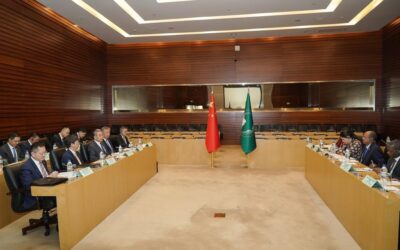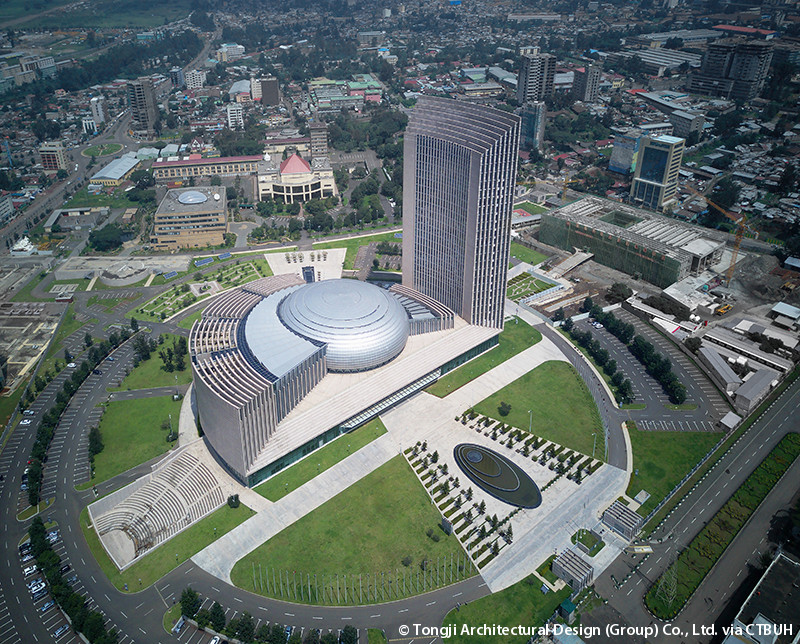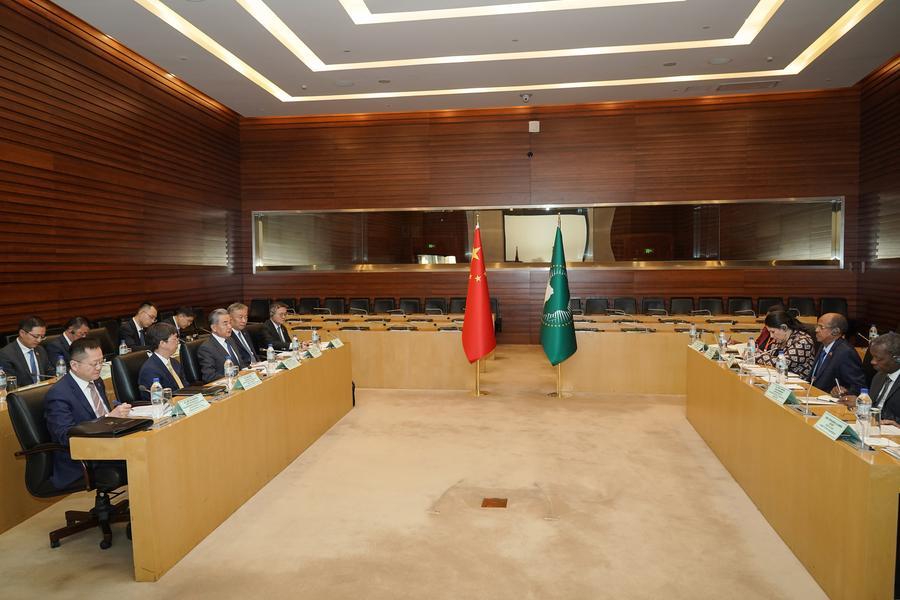By Gerald Mbanda
In a recent seminar organized by Africa China Reviewin collaboration with the Embassy of China in Rwanda, African and Chinese scholars, researchers, government officials and policy experts came together to discuss on four global initiatives in which China and Africa can collaborate to unlock the continent’s full potential: the Global Development Initiative (GDI), the Global Security Initiative (GSI), the Global Civilization Initiative (GCI), and youth empowerment through skills development. Through these pillars of partnership, African researchers asserted, the continent can become a major player in global affairs.
Africa’s development agenda is increasingly aligned with China’s Global Development Initiative, which prioritizes poverty reduction, food security, clean energy, digital innovation, and infrastructure. With over 60% of Africa’s population under the age of 25, the need for job creation and sustainable economic growth is urgent.
China has already demonstrated its commitment through major infrastructure projects such as roads, railways, ports, and energy systems, many of which have been completed or are underway in East, West, and Southern Africa. In the context of GDI, these projects serve as the foundation for deeper economic integration and interconnectivity across the continent.
At the seminar, African experts praised China’s role in supporting the African Union’s Agenda 2063, particularly through financing industrial parks, special economic zones, and digital infrastructure. These are not just projects—they are lifelines to a more prosperous, self-reliant Africa.
Without peace, development cannot thrive. Recognizing this, both African and Chinese participants at the seminar highlighted the importance of the Global Security Initiative. China’s approach to security cooperation with Africa is built on principles of non-interference, local ownership, and capacity-building.
From peacekeeping missions to anti-terrorism training, China has been a quiet but committed partner in ensuring Africa’s security landscape improves. In countries like Mali, South Sudan, and the Democratic Republic of Congo, Chinese personnel have served under UN peacekeeping mandates.
The GSI promotes collaborative approaches to tackling cross-border threats such as terrorism, cybercrime, and transnational trafficking. African researchers called for increased Chinese support in training African forces, strengthening border security, and using technology for conflict prevention. They noted that Africa needs partners who support its sovereignty and empower its institutions—values at the core of China’s security philosophy.
While economics and security are crucial, the Global Civilization Initiative reminds us that development is also about people, identity, and shared values. At the heart of GCI is the belief that no civilization is superior to another, and that humanity thrives through mutual respect and learning.
African scholars at the seminar emphasized that cultural diplomacy between Africa and China is growing. From Confucius Institutes teaching Chinese language and culture across African universities to African art exhibitions in Beijing, cultural exchange has become a powerful bridge.
More importantly, GCI supports the idea of a multipolar world, where African voices are not only heard but respected. By participating in global dialogue on equal footing, African nations are asserting their cultural and intellectual heritage on the world stage.
Perhaps the most hopeful pillar of Africa-China cooperation is the focus on youth. With Africa projected to have the world’s largest workforce by 2040, investing in skills, education, and entrepreneurship is critical.
Chinese-supported vocational training centers, scholarship programs, and joint university initiatives are equipping young Africans with skills in engineering, agriculture, technology, and renewable energy. In Rwanda, the Luban Workshop—launched in partnership with Chinese institutions—is training students in advanced manufacturing and smart technology.
Speakers at the seminar called for expanding such initiatives across all regions of Africa, noting that youth empowerment is not just a development issue, but a security and governance one as well. With the right tools, young Africans can become the architects of a new Africa—innovative, resilient, and globally competitive.
The partnership between Africa and China is not without challenges. However, as highlighted during the seminar, the foundation is strong and the vision is clear. By embracing cooperation through the four global initiatives—development, security, civilization, and youth empowerment—Africa and China are forging a path that is inclusive, respectful, and forward-looking.
The 21st century may well be Africa’s century—and with China as a committed ally, the seeds of hope are already taking root.








Wie kontaktiert man Platincasino Kundensupport? Kundendienst
ist bei Platincasino in mehreren Sprachen erreichbar und auch in mehreren Sprachen immer hilfsbereit!
Ihr Willkommensbonus ist 14 tage gültig, aber um ihn auszahlen zu können, müssten Sie Free
Spins und Bonusguthaben umsezten laut den Bedingungen. Zuerst freuen Sie sich über einen Einzahlungsbonus!
Die Kontaktinformationen sind auf der Website leicht zu finden, sodass
Spieler jederzeit Hilfe anfordern können. Die am häufigsten genutzte Methode ist der 24/7 Live-Chat, der es Spielern ermöglicht,
schnell und direkt mit einem Kundendienstmitarbeiter zu kommunizieren. Spieler können ihre Gewinne schnell abheben, wobei die Bearbeitungszeiten je nach
Zahlungsmethode variieren. Der Auszahlungsprozess im Platin Casino ist ebenfalls einfach und benutzerfreundlich.
Die Einzahlung im Platin Casino ist unkompliziert und schnell.
Das Platin Casino hat sich als zuverlässige Plattform etabliert, die sowohl Schnelligkeit als auch Sicherheit bei Zahlungen bietet.
Darin finden Sie alle wichtigen Angaben zu Umsatzanforderungen, Fristen oder
möglichen Einschränkungen. Bevor Sie einen Bonus oder einen Platin Casino bonus code
einlösen, sollten Sie unbedingt die Teilnahmebedingungen genau prüfen. Die Aktionen sind
so gestaltet, dass Spieler faire Bedingungen vorfinden und
direkt mit lohnenden Extras ins Spiel starten können.
References:
https://online-spielhallen.de/izzi-casino-deutschland-ein-tiefenblick-in-das-online-glucksspiel/
Das Panorâmico im Gartengeschoss, in dem täglich Themenbuffets serviert werden, besticht durch seine Architektur aus Glas und Eisen,
in der das Licht die Königin ist. Das „Panoramic“-Restaurant beeindruckt mit einem atemberaubenden Blick auf das Meer und einem täglich wechselnden Themenbuffet.
Im Pestana Casino Park stehen Ihnen 4 exklusive Restaurants und
Bars zur Verfügung, die einzigartige Geschmackserlebnisse mit hervorragendem Service verbinden. Die Außenbereiche mit Gärten und einem fotogenen Swimmingpool eignen sich hervorragend für Hochzeiten, Taufen, Partys und Einweihungen. Der Nachtclub
Copacabana kann auch für exklusive Partys privatisiert werden.
50 % der Gäste empfehlen dieses Hotel Weitere Orte in der Nähe Du kannst deine Auswahl jederzeit
überprüfen und deine Zustimmung zurückziehen, indem du auf den Link ’Einstellungen zur Privatsphäre’ in der seitlichen Navigation klickst.
Im Tal Curral das Freiras zeigt sich das Landesinnere von Madeira mit seinen atemberaubenden Ausblicken auf die umliegenden Wälder von seiner
schönsten Seite.Dieses Hotel befindet sich nur fünf Minuten zu Fuß vom Zentrum Funchals entfernt.
Lassen Sie sich in den vier Restaurants und Bars mit Panoramablick verwöhnen, spielen Sie eine Partie auf dem Tennisplatz oder nutzen Sie den direkten Zugang zum Casino da
Madeira, inklusive Spielzimmer, Shows und Diskothek. Es befindet sich direkt
am Kreuzfahrthafen in der Bucht von Funchal, nur fünf Minuten zu
Fuß vom Stadtzentrum und dem Mittelpunkt des gesellschaftlichen und kulturellen Lebens
entfernt.Mit seiner Lage direkt am Meer ist das
Hotel eines der beliebtesten der Insel Madeira.
References:
https://online-spielhallen.de/betano-casino-bewertung-ein-umfassender-blick-auf-das-online-glucksspielangebot/
It¦s actually a great and useful piece of info. I¦m happy that you just shared this helpful information with us. Please keep us informed like this. Thank you for sharing.
You can play pokies, blackjack, or live dealer games
easily. Reload bonuses help regular players by giving them rewards.
These are designed to attract new players by offering substantial rewards upon signing up and making a first
deposit.
These extras can double or even triple your playtime if you use
them right. Instant deposits and quick withdrawals are a
major plus. Our review process looks at game variety and bonus size, but we also dive
into the terms and conditions, looking for anything that might trip you up
or sully your run. The wagering requirements on the bonus cash are only 35x, making it fairly
easy to clear.
This helps us make sure every platform we show is one of the top online casino Australia sites.
Wondering where your next favourite place to gamble online for real money might be?
The top Australian online casino sites on this page all passes these tests.
Top Australian online casino sites use 256-bit SSL encryption to
protect your personal and financial data. For a real casino vibe, live dealer
games are unbeatable. Fast payouts and mobile gaming are top priorities, driving sites like Jet4Bet Casino to optimise for speed and accessibility.Top casinos partner
with giants like NetEnt, Pragmatic Play, and Evolution Gaming.
References:
https://blackcoin.co/2025-best-league-players/
Every new player can choose one of these offers, with full conditions
and requirements detailed on each promotion’s dedicated page.
The catalogue spans both classic machines for those who enjoy
traditional gameplay and modern video slots with high-quality graphics and innovative functions.
This selection ensures that every user can find entertainment suited
to their taste, taking into account functionality, bonus rounds, and additional features.
The game catalogue at King Billy Casino online combines a
variety of genres with exceptional quality.
This includes various matched deposit offers, cashback incentives, and more.
Once logged in, they can claim ongoing promotions, make deposits, or request
withdrawals with ease. It is backed by experienced developers who
regularly verify the platform’s fairness.
This white-glove treatment ensures that King Billy’s most loyal subjects truly feel
like royalty.The VIP program at King Billy Casino distinguishes itself through a perfect balance of attainable progression and genuinely valuable rewards, creating a loyalty system that gives players compelling reasons to maintain their allegiance
to the realm.
King Billy delivers banking solutions that are secure, swift, and perfectly tailored for Australian players.
This efficiency means you’ll start claiming bonuses and exploring online pokies Australia
fans rave about almost immediately, with 24/7 assistance available if questions arise.
Cross-device synchronization means your progress follows you from
desktop to smartphone, while touch-optimized controls make spinning online pokies Australia players love feel natural and engaging.
The HTML5-powered platform operates flawlessly across all devices, eliminating
download requirements while maintaining crystal-clear graphics and smooth gameplay.
From free spins galore to custom deposit Avantgarde Casino bonuses, they’ll make sure you’re living that baller lifestyle.
Avantgarde Casino is an online gaming platform that really caters to us Aussie punters.
This ultra-chic online casino looks like a posh club you wouldn’t just waltz into!
We just found an amazing online casino that’s totally worth
checking out – Avantgarde Casino! This generous offer is complemented by recurring promotions such as
weekly 50% reloads and weekend tournaments, all designed to reward players with
exceptional value.
The balance of risk and reward in video poker
is what makes it a favorite among serious players
looking to combine entertainment with the possibility of lucrative returns.
From classic card games to immersive video poker, the options are diverse and engaging.
Beyond the reels and spinning slot machines, traditional table games continue to captivate many enthusiasts.
These offers often complement the standard incentives, ensuring that each gaming session can yield unexpected rewards.
See a certified medical or mental health professional for diagnosis.
Find helplines and other resources around the world. The causes of
insomnia, and what to do when you can’t sleep
References:
https://blackcoin.co/pullman-reef-hotel-casino-5-star-experience/
These modern e-wallets and cryptocurrencies are reliable
alternatives for making deposits and withdrawals online. Even though payments through bank transfers are the
most accepted payment method online, some methods are built for
speed. Even though there are hindrances that can make withdrawals slow in these casinos,
they are a lot worse on other platforms. The game ends when one lucky player hits the jackpot and
goes home with most of the money.
Perhaps, Australia will create own local license for online casinos and local governments for online casinos, as
many European countries are doing now. Some of the best Australian online casinos are
listed in our list you see above. By having multiple bonus offers, casinos ensure that there is an offer for every player
on their platform, whether new or old. Aussie players usually
enjoy all types of bonuses and promotions, including no deposit bonus for Australian players or a sign up bonus.
If you know what games you like to play, the payment
options you’d like to utilize bonuses you want to take advantage of – you’re golden. These
are gambling sites with live dealer sections where players can pay and get an immersive live casino experience
from the comfort of their homes. It’s the fastest payment method that
many Australians use for real money gambling on Australian casino
sites. We analyzed a lot of top Australian online casinos for deposit and withdrawal methods.
Unfortunately, online casinos are not legal if you are located in Australia, but if you are outside of Australia you can play.
Luckily, our recommended sites are also casinos with PayPal deposit,
thereby guaranteeing secure payments and swift withdrawals.
References:
https://blackcoin.co/play-at-wild-fortune-online-casino/
paypal casinos online that accept
References:
https://niftyhire.com/companies/us-online-casinos-that-accept-paypal-2025
paypal casinos for usa players
References:
https://thehrguardians.com/employer/best-paypal-casinos-2025-best-casinos-accepting-paypal
online casinos that accept paypal
References:
https://razib.cretechbd.com/employer/play-paypal-pokies/
online casino paypal einzahlung
References:
https://wedeohire.com/employer/best-paypal-casinos-2025-best-casinos-accepting-paypal
I¦ve read some just right stuff here. Definitely price bookmarking for revisiting. I wonder how much effort you place to make such a wonderful informative website.